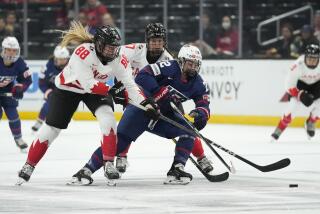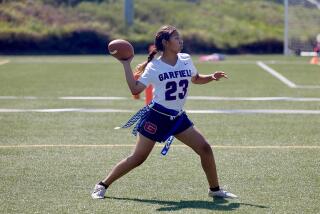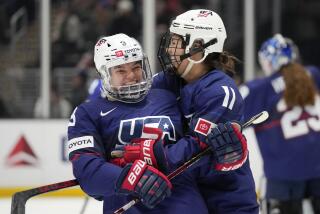In Sport of Team Handball, There’s a Team . . . but No Handball : Olympic Festival: Obscurity of sport in United States allows inexperienced Lisa Bassi to team with veteran Rhonda Weyer on West team.
- Share via
It is one of Europe’s favorite team games. In most countries, it is second in popularity only to soccer. European boys and girls play this contact sport daily in the schools. Yet, in the United States, team handball is virtually nonexistent.
In a way, that is good news for Fullerton College softball Coach Lisa Bassi. Team handball’s obscurity here has helped Bassi, 28, make the U.S. Olympic Sports Festival West team--despite having virtually no experience playing the sport.
She joins the West’s most experienced veteran, Rhonda Weyer, 27, a Katella High School softball coach who has played the sport for six years.
Team handball competition begins Wednesday in Minneapolis, with the gold-medal game Sunday. Until then, the North, South, East and West teams will practice and scrimmage.
The scrimmaging is a must, especially for Bassi, who has been playing the sport only since April when she went to the Sports Festival tryouts in Calabasas, Calif.
“I think she is going to pick up the game very quickly because she is used to playing ball and she wants to learn,” said Henriette Hansen, the West’s coach. “She is like, ‘Can we play? Can we play?’ She can’t get enough, and that is very important when you are not young anymore and you want to learn a new sport.”
Practice time was limited before the West squad headed to Minneapolis. “We have had one practice as a team before coming out here,” Bassi said. “The coach said, ‘What position do you play?’ and I laughed. That’s exactly what I did. I said, ‘Whatever you want to me to play.’ ”
Team handball is nothing like handball, where two people use their hands to hit a racquetball-sized sphere against a wall.
“It is incredibly physical,” said Bassi, who lives in Huntington Beach. “They say it is water polo without the water, soccer without the kicking and hockey without the sticks. So you can imagine the aggressiveness of the sport.”
Don’t think that a beginner such as Bassi made the team just because there are so few experienced handball players in the country. Though she is a novice, her athletic credentials are impeccable.
She played on Sports Festival softball teams for five years. She played club volleyball, and basketball and softball during her high school years at Chaffey. She attended Cal Poly Pomona, where she competed in softball and cross-country.
Bassi has the kind of background that coaches look for in a team handball player.
“They are looking for people who have athletic ability, period , which is unlike all the other sports because the athletes are highly trained specifically for their sport,” Bassi said.
Hansen, who lives in Newport Beach, got the job as West coach only a month ago after the original coach accepted an offer to play professional basketball in Japan. Hansen is a native of Denmark, the origin of team handball.
“I always say that if you are a good basketball player but not good enough to make it on a big league team, then team handball is a good thing because you have a (better) chance to be on the national team,” Hansen said.
Bassi dreamed of playing basketball, her first love, in the Olympics, but her 5-5 height made that difficult. The contact in team handball never intimidated her; in fact, she requested to play one of the more physical positions--circle runner.
The circle runner sets picks against defenders along a half circle that protects a net or goal. The picks are designed to free teammates for shots. “You have to be strong to play the circle because you are fighting with the defensive players,” Hansen said. “You are the only one who is in contact with them all the time. You can’t be scared of hurting your knees, because the team you’re going to play against is going to throw you around.”
Bassi has no such fear. “I don’t think I enjoy abuse, but I enjoy contact,” she said. “I was raised with my older brother. He was very athletic and liked to roughhouse, and I was his little brother, so to speak. I just developed that aggressive behavior along the way.”
It comes in handy for team handball, but players who get too physical are penalized by temporarily being removed from play.
Team handball is most often played on a wooden surface a bit wider and longer than a basketball court. As in basketball, one can dribble and pass.
At either end of the court is a goal about 10 feet wide and 6 feet tall, protected by a goalie. Six court players attempt to throw a volleyball-sized ball past the goalie to score a single point in the course of two 30-minute halves. There are no timeouts.
The goal is surrounded by a half-circle, where most of the action takes place. Defensive players line up along it.
“The half-circle represents the goalie area,” Weyer explained. “Nobody is allowed in that area except the goalie, unless you’re going to shoot. That is where the diving comes in. You must shoot the ball before you hit the floor in the circle area.”
Diving is Weyer’s specialty. She earned a reputation as a flopper during her basketball days at Cal State Fullerton from 1981-85, when she hit the hardwood as regularly as a dust mop.
She became involved with team handball after college. She played for the West basketball team at the 1981 Sports Festival. She first saw team handball at Cal State Fullerton, where there was a club team. She also worked as a supervisor for the 1984 Olympics at the team handball venue at Fullerton.
The contact in the game didn’t intimidate her, she said. “It is a much quicker game than basketball. It was something different. I had never seen it before and it was an eye-catcher for me . . . being able to make shots against a goalie, diving and the different passes, the finesse of the games. It was like watching the Lakers and Magic Johnson with all these fantastic passes and shots.”
Weyer was hooked. She has been on the national team for the past 2 1/2 years and played for the West in the 1985, ‘86, ’87 and ’89 Sports Festivals, which are held in non-Olympic years.
She trained with the national team at Marquette, Mich., and at the Olympic Training Center in Colorado Springs, Colo., for almost two years. She missed an opportunity to play in the 1988 Olympics after spraining her right thumb in the summer of 1987 and had to have her hand placed in a cast. The cast came off six weeks later, but in the interim, there had been a coaching change and Weyer said she was lost in the shuffle.
Weyer decided to return to Cal State Fullerton for her final year and her degree.
Weyer plays one of the primary shooting positions. “Her strength is that she makes only a few errors in the game, she knows what she is doing and she is strong,” Hansen said.
Weyer is weighing whether she will try again to make the Olympic team, that is if the United States qualifies for Olympic competition in the sport.
“They have asked me back to Colorado Springs quite a few times, but I have been committed to other things, like coaching softball at Katella, and I would like to get my teacher’s credential,” Weyer said. “I possibly might. It is something I need to think about a little bit more.”
Bassi, on the other hand, knows her niche is at Fullerton College, where she teaches physical education and coaches the softball team.
“My motivation for playing team handball is really twofold,” Bassi said. “What I would like to do, obviously, is compete. And No. 2, what I would like to do is teach a class, develop a team handball class for Fullerton College and teach and promote the sport.
“We really need to get developmental programs going at the high school level to make this a sport to stay in America.”
More to Read
Go beyond the scoreboard
Get the latest on L.A.'s teams in the daily Sports Report newsletter.
You may occasionally receive promotional content from the Los Angeles Times.






